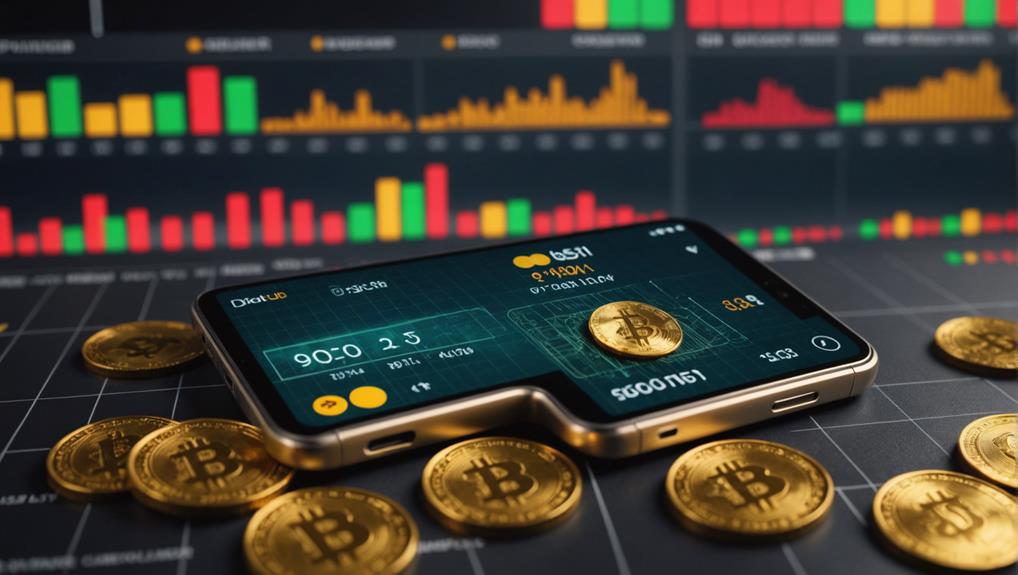Investing in digital gold offers a host of benefits that appeal to modern investors. The convenience and accessibility provided by digital platforms make it an attractive option for those looking to diversify their portfolios.
Blockchain technology ensures secure transactions, and the ability to own fractional amounts opens up investment opportunities for a wider range of individuals.
However, it's essential to consider potential drawbacks. Market volatility can pose challenges, along with regulatory uncertainties that may impact the investment landscape. Additionally, the lack of physical ownership raises concerns about security and accountability.
Understanding these factors is vital for anyone looking to explore this innovative investment avenue.
Key Insights
- Digital gold offers diversification by adding a new asset class to your investment portfolio.
- Market volatility and cybersecurity threats pose significant risks to digital gold investments.
- Digital platforms allow for 24/7 buying and selling of digital gold for enhanced accessibility.
- Regulatory uncertainty surrounding digital assets can affect the stability and legality of digital gold investments.
- Investors benefit from guaranteed 24 karat purity and certification by government-licensed agencies.
Convenience and Accessibility

The appeal of digital gold as an investment option lies in its convenience and accessibility for modern investors. With digital gold, investors can buy and sell 24/7, allowing for transactions at any time and providing flexibility.
Purchasing small denominations of digital gold directly from mobile devices simplifies the investment process, making it convenient for investors. Online platforms for digital gold offer easy access, enabling quick transactions without the need for physical storage. These platforms also help investors efficiently manage and track their investment portfolios, ensuring they have real-time information on market movements.
In essence, the accessibility and convenience of digital gold offer a flexible and efficient way for investors to include gold in their portfolios, aligning with contemporary investment practices.
Security and Storage
Digital gold is securely stored in insured vaults to ensure the safety and security of investments, providing peace of mind to investors. This storage method guarantees protection against theft and other risks, backed by 24K gold certified by government-licensed agencies for purity and authenticity.
Investors have the option for physical delivery, allowing conversion into a tangible asset that can be securely stored personally. It's important to note that some companies may impose delivery and making charges, impacting the overall cost and convenience. Nevertheless, the assurance of insured vaults significantly enhances the security of digital gold investments.
Low Investment Minimums

Digital gold revolutionizes investment accessibility by offering low minimum amounts, sometimes as nominal as one rupee. This inclusive feature expands participation to individuals with limited funds, empowering them to embark on their investment journey.
The ability to start with minimal amounts supports gradual portfolio expansion, allowing investors to increase their stakes as they gain confidence. This adaptable approach encourages diversity in investment portfolios, effectively spreading risk across various assets.
- Accessibility: Broadens investor participation.
- Progressive Portfolio Building: Facilitates incremental investment growth.
- Flexibility: Empowers starting small and scaling up.
- Variety: Promotes risk diversification across investments.
Liquidity and Ease
Digital gold stands out for its exceptional liquidity and accessibility, complementing its low investment minimums. Investors can easily buy and sell their digital gold holdings online with minimal effort, ensuring quick conversion to cash and providing essential trading flexibility.
This agility proves invaluable in responding promptly to market fluctuations, enabling swift decision-making. The seamless online transaction process eliminates the necessity for physical handling or storage, simplifying the overall investment experience. With round-the-clock access to their digital gold portfolios, investors can manage their assets effortlessly.
The liquidity and ease of digital gold make it a compelling choice for modern investors seeking efficient and flexible investment avenues.
Purity and Quality Assurance

Investing in digital gold offers the advantage of guaranteed 24 karat purity, certified by government-licensed agencies. This certification ensures transparency and authenticity, making digital gold a trustworthy investment option.
The stringent quality standards maintained by storing gold in insured vaults further enhance the reliability of this investment. With the assurance of purity and the backing of government certification, investors can confidently choose digital gold as a secure and top-grade asset.
Risks and Lack of Regulation
When considering investments in digital gold, investors should be mindful of the risks associated with the lack of regulatory oversight from entities like the RBI or SEBI. The absence of regulation creates potential legal complexities and compliance hurdles, as digital gold may not be universally recognized as collateral by all lenders or merchants.
Additionally, investors run the risk of having their accounts deactivated if they fail to adhere to specific terms, such as storage time limits. Understanding these risks is crucial for making well-informed investment choices.
Physical Ownership Limitations

Physical ownership limitations are a crucial aspect to consider when investing in digital gold, alongside regulatory risks. These limitations can impact investors in various ways:
- Storage restrictions: Providers may limit the amount of digital gold that can be stored.
- Investment limits: Maximum limits may be imposed on the purchase or conversion of physical gold from digital holdings.
- Delivery restrictions: Providers' terms and conditions could restrict the physical delivery of gold.
- Platform policies: Different platforms have their own rules regarding the quantity of physical gold that investors can hold.
Understanding and navigating these limitations is essential for making well-informed investment decisions.
Comparison to Physical Gold
Digital gold, known for its convenience, liquidity, and secure storage, offers a stark contrast to the challenges and additional expenses associated with physical gold ownership.
Unlike physical gold, which necessitates costly and cumbersome safe storage solutions, digital gold eliminates the need for physical storage, resulting in reduced expenses.
Additionally, digital gold allows for real-time monitoring and typically incurs lower fees compared to investing in physical gold. The global accessibility of digital gold enables easy conversion to other currencies, providing investors with significant flexibility.
Ultimately, the decision between digital and physical gold depends on individual preferences and investment objectives, as each option presents unique advantages and considerations.
Tax Implications

Understanding the tax implications of digital gold investments is crucial for optimizing returns and financial planning.
In particular, short-term capital gains tax of 15% applies if the asset is sold within three years, while long-term capital gains tax of 10% is applicable for holdings exceeding three years, with gains over Rs 1 lakh.
It is important for investors to consider the 3% GST on transactions, which can further impact overall profitability.
Capital Gains Tax
Investors must consider the varying capital gains tax rates on digital gold, which depend on the duration of holding. Short-term investments are subject to a 15% capital gains tax, applicable to profits earned within three years of purchase.
In contrast, long-term investors benefit from a lower tax rate of 10% on profits realized after three years. Understanding and accounting for these tax implications are essential for effective tax planning and maximizing returns on long-term digital gold investments.
Holding Period Requirements
The duration for which digital gold is held significantly impacts the applicable capital gains tax rate, directly affecting the investment's net returns.
If digital gold is held for less than three years, it is subject to short-term capital gains tax, which corresponds to the investor's regular income tax rate.
Conversely, holding digital gold for over three years qualifies for long-term capital gains tax, typically at a lower rate.
Understanding these tax implications is crucial for maximizing investment returns, as the holding period plays a vital role in determining the overall profitability by influencing the tax treatment.
Seeking advice from a financial advisor can offer personalized assistance in navigating the tax requirements based on the specific holding period for digital gold investments.
Suitability Based on Goals
In assessing the compatibility of digital gold with your investment objectives, it is essential to consider factors such as convenience, liquidity, and secure storage. Digital gold is an ideal option for those seeking to integrate gold-backed cryptocurrencies into their investment portfolio. It serves as a contemporary approach to preserving capital while granting easy access to small gold denominations.
Key points to consider include:
- Convenience: Digital gold facilitates seamless transactions and real-time monitoring.
- Liquidity: Its high liquidity ensures swift buying and selling of assets.
- Secure Storage: By eliminating the need for physical storage, it reduces associated costs.
- Low Fees: Digital gold often entails lower transaction costs compared to traditional gold investments.
Evaluate how digital gold complements your overall investment strategy and harmonizes with your risk tolerance levels.
Conclusion
Investing in digital gold offers a range of benefits, including diversification, easy access, and transparency. However, it also comes with challenges such as market volatility and regulatory uncertainties. It is crucial to weigh these pros and cons carefully to make informed investment decisions.
Understanding the nuances of digital gold, its differences from physical gold, and tax implications is essential for aligning investment strategies with individual financial goals. By balancing these factors, investors can navigate this evolving investment landscape effectively.
The Gold Information Network
11900 Biscayne Blvd, Ste 127B, Miami, FL 33181
(305) 449-9094
https://goldinfo.net







